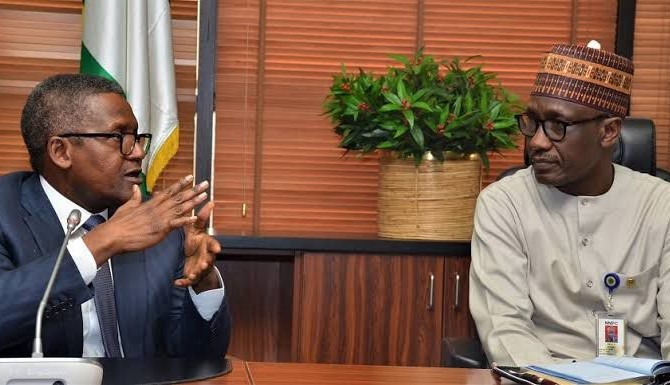The face-off between Dangote Group President Aliko Dangote and oil sector regulators raged on yesterday with Group Chief Executive Officer of Nigerian National Petroleum Company Limited(NNPCL), Mele Kyari, challenging him to name the officials he alleged owned a blending plant in Malta.
Kyari said this was necessary given the ‘’grave implications’’ the action has on ‘’national energy security.’’
The NNPCL boss threw the challenge just as Dangote who is the promoter of the 650,000 barrels per day Dangote Petroleum Refinery in Ibeju-Lekki, Lagos, got the support of Guregu Power PLC Chairman, Femi Otedola in the feud.
Development Agenda for Western Nigeria (DAWN) Commission urged President Bola Ahmed Tinubu, to wade into the controversy.
Kyari, in a post yesterday on his X(formerly Twitter), said he has no crude oil blending plant anywhere in the world. He also stated that he had no knowledge of any NNPCL officials that do but vowed to sanction any brought to his know.
His tweet read in part: “For further assurance, our compliance sanction grid shall apply to any NNPCL employee who is established to be involved in doing so if availed and I strongly recommend that such individuals be declared public and be made known to relevant government security agencies for necessary actions given the grave implications for national energy security.”
Kyari explained that he decided to respond to the allegation by Dangote because he had been ‘’inundated by inquiries from family members, friends, and associates on the public declaration by the President of Dangote Group.’’
He added: “ I do not own or operate any business directly or by proxy anywhere in the world with the exception of a local mini-Agric venture. Neither am I aware of any employee of the NNPC, that owns or operates a blending plant in Malta or anywhere else in the world.
“A blending plant in Malta or any part of the world has no influence over NNPCL’s business operations and strategic actions.”
Otedola, a billionaire businessman and Dangote’s close associate said Nigeria, should ‘’recognise and support’’ business titans like Dangote, as done in other climes.
The Guregu Energy PLC boss listed the United States, South Africa, Vietnam, South Africa, Brazil, and China as countries that intentionally encourage their business ‘’titans.’’
He described Dangote oon his X as the largest private sector employer of labour in the country, and his companies are among the largest taxpayers.
His tweet reads in part: “My brother, the visionary, has built the largest single train refinery in the world, not in Kano, but in Lagos State. He is the owner of the second-largest sugar refinery in the world, also in Lagos State, and the largest cement factory in the world, not in Kano, but in Kogi State. ‘’Additionally, he has established one of the second-largest fertiliser plants in the world, soon to surpass the biggest one in Qatar, also in Lagos State. Furthermore, he has built a fertiliser plant in Lagos that already exports globally. Aliko Dangote is a titan that God created specially for mankind.
“Aliko Dangote is also the largest private sector employer of labour in the country, and his companies are among the largest taxpayers.
‘’ In fact, the Dangote Group often pays more in taxes than the top banks combined. If not for him, we would still be importing cement. His contributions extend beyond industrial facilities to critical infrastructure, having built major roads such as the Apapa Oshodi-Owonrosoki Express Road, Wharf Road, and the Obajana-Kabba Road.
“Countries in the nascent stages of industrialisation require visionary leaders. This is why it’s no surprise that the United States was built by the vision and tenacity of a few remarkable individuals—Cornelius Vanderbilt, John D. Rockefeller, Andrew Carnegie, J.P. Morgan, and Henry Ford—the men who built America’s industrial landscape. These men left the world without these assets but left behind a legacy that has kept their country thriving generation after generation.
‘’Their contributions were immortalised not in the material wealth they amassed but in the enduring institutions and industries they established. These visionaries were also supported by their government, which recognised the importance of fostering local champions.’
“Similarly, today’s tech giants like Microsoft and Tesla received substantial support from the US Government. For example, in January 2010, the Department of Energy issued a $465 million loan to Tesla Motors to produce specially designed, all-electric plug-in vehicles and to develop a manufacturing facility in Fremont, California to produce battery packs, electric motors, and other powertrain components for powering these innovative vehicles. This initiative is part of broader efforts, such as the federal EV-charging program supported by the infrastructure law known as the National Electric Vehicle Infrastructure program or NEVI.
“In India, the government has been instrumental in supporting business titans like Gautam Adani and Mukesh Ambani. Their companies have received significant backing to grow and expand, contributing substantially to India’s economic growth and global business footprint.
“There are also records of emerging market countries like Vietnam, South Africa, Brazil, and China where their governments have supported local businesses to jump-start industrialization. In Vietnam, the government has provided various incentives to tech companies, fostering a rapidly growing technology sector. In South Africa, government support for the mining industry has been crucial in maintaining its global competitiveness.
“Brazil has seen substantial government investment in its agricultural sector, transforming it into one of the world’s leading food exporters. In China, government backing for companies like Huawei and Alibaba has propelled them to global leadership in technology and e-commerce.”






